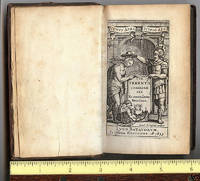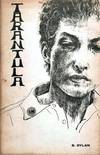
Comoediae sex.-Plays, 1635 of Terrence (195/185-159 BC; Greek Playwright)
by Terentius Afer, Publius (Terrence)
- Used
- Fine
- Hardcover
- Condition
- Fine/None Present
- Seller
-
Swampscott, Massachusetts, United States
Payment Methods Accepted
About This Item
Terentius Afer, Publius. Comoediae sex. [48], 304, [6] pages, including engraved title by Cornelius Claude Dusend. 12mo, contemporary French citron morocco lavishly gilt-tooled to center-and-corner design of pointille volutes and small ornamental tools around blank center oval on covers, vertical ornamental rolls on flat spine, joints slightly rubbed. Amsterdam: Officiana Elzeveriana, 1635 Second of 5 editions with this imprint, date, and pagination described under willems 433, Provenance: Howard Granville Hanrott (19th Century initialed catalogue note and armorial bookplate); George G. Tillotson (sale, Anderson Auction Company, 1 February 1910, lot 53 sale marked $11.00). Sold Swan Galleries Sale 2041 lot 175, $360.00. No copies found.
Publius Terentius Afer (195/185–159 BC), better known as Terence, was a playwright of the Roman Republic. His comedies were performed for the first time around 170–160 BC, and he died young probably in Greece or on his way back to Rome. Terentius Lucanus, a Roman senator, brought Terence to Rome as a slave, educated him and later on, impressed by his abilities, freed him. All of the six plays Terence wrote have survived. One famous quotation by Terence reads: "Homo sum, humani nil a me alienum puto", or "I am a man, I consider nothing that is human alien to me." This appeared in his play Heauton. Terence's date of birth is disputed; Aelius Donatus, in his incomplete Commentum Terenti, considers the year 185 BC to be the year Terentius was born; Fenestella, on the other hand, states that he was born ten years earlier, in 195 BC.
He may have been born in or near Carthage or in Greek Italy to a woman taken to Carthage as a slave. Terence's ethnonym Afer suggests he lived in the territory of the Libyan tribe called by the Romans Afri near Carthage prior to being brought to Rome as a slave. This inference is based on the fact that the term was used in two different ways during the republican era: during Terence's lifetime, it was used to refer to anyone from the land of the Afri (Africa, meaning Northern Tunisia including Carthage); later, after the destruction of Carthage in 146, it was used to refer to non-Carthaginian Berbero-Libyans, with the term Punicus reserved for the Carthaginians. It is therefore possible that Terence was of Libyan descent, considered ancestors to the modern-day Berber peoples. In any case, he was sold to Terentius Lucanus, a Roman senator, who educated him and later on, impressed by Terence's abilities, freed him. Terence then took the nomen Terentius, which is the origin of the present form. When he was 25, Terence left Rome and he never returned, after having exhibited the six comedies which are still in existence. Some ancient writers tend to say that he died at sea. Like Plautus, Terence adapted Greek plays from the late phases of Attic comedy. He was more than a translator, as modern discoveries of ancient Greek plays have confirmed. However, Terence's plays use a convincingly 'Greek' setting rather than Romanizing the characters and situations. Terence worked hard to write natural conversational Latin, and most students who persevere long enough to be able to read him in the vernacular find his style particularly pleasant and direct. Aelius Donatus, Jerome's teacher, is the earliest surviving commentator on Terence's work. Terence's popularity throughout the Middle Ages and the Renaissance is attested to by the numerous manuscripts containing part or all of his plays; the scholar Claudia Villa has estimated that 650 manuscripts containing Terence's work date from after 800 AD. The mediaeval playwright Hroswitha of Gandersheim claims to have written her plays so that learned men had a Christian alternative to reading the pagan plays of Terence, while the reformer Martin Luther not only quoted Terence frequently to tap into his insights into all things human but also recommended his comedies for the instruction of children in school.
Terence's six plays are:
* Adelphoe (The Brothers)
* Andria (The Girl from Andros)
* Eunuchus; Restoration poet and playwright Sir Charles Sedley modelled his comedy Bellamira: or, The Mistress (1687) partly on this play.
* Heauton Timorumenos (The Self-Tormentor)
* Hecyra (The Mother-in-Law)
* Phormio
The first printed edition of Terence appeared in Strasbourg in 1470, while the first certain post-antiquity performance of one of Terence's plays, Andria, took place in Florence in 1476. There is evidence, however, that Terence was performed much earlier. The short dialogue Terentius et delusor was probably written to be performed as an introduction to a Terentian performance in the ninth century (possibly earlier). A phrase by his musical collaborator Flaccus for Terence's comedy Hecyra is all that remains of the entire body of ancient Roman music. This has recently been shown to be unauthentic.
Reviews
(Log in or Create an Account first!)
Details
- Bookseller
- Calix Books
(US)
- Bookseller's Inventory #
- biblio41
- Title
- Comoediae sex.-Plays, 1635 of Terrence (195/185-159 BC; Greek Playwright)
- Author
- Terentius Afer, Publius (Terrence)
- Illustrator
- Cornelius Claude Dusend
- Format/Binding
- 12mo contemporary French citron morocco lavishly gilt-tooled to center-and-corner design of pointille volutes and small ornament
- Book Condition
- Used - Fine
- Jacket Condition
- None Present
- Quantity Available
- 1
- Edition
- 2nd Edition, contemporary French citron morocco lavishly gilt-to
- Binding
- Hardcover
- Publisher
- Elzeveriana
- Place of Publication
- Amsterdam
- Date Published
- 1635
- Weight
- 0.00 lbs
- Keywords
- Plays, Terrence, Roman Theatre
- Bookseller catalogs
- Art and Poetry;
- Size
- 12mo
Terms of Sale
Calix Books
30 day return guarantee, with full refund including original shipping costs for up to 30 days after delivery if an item arrives misdescribed or damaged.
About the Seller
Calix Books
About Calix Books
Glossary
Some terminology that may be used in this description includes:
- Morocco
- Morocco is a style of leather book binding that is usually made with goatskin, as it is durable and easy to dye. (see also...
- Spine
- The outer portion of a book which covers the actual binding. The spine usually faces outward when a book is placed on a shelf....
- 12mo
- A duodecimo is a book approximately 7 by 4.5 inches in size, or similar in size to a contemporary mass market paperback. Also...
- G
- Good describes the average used and worn book that has all pages or leaves present. Any defects must be noted. (as defined by AB...



